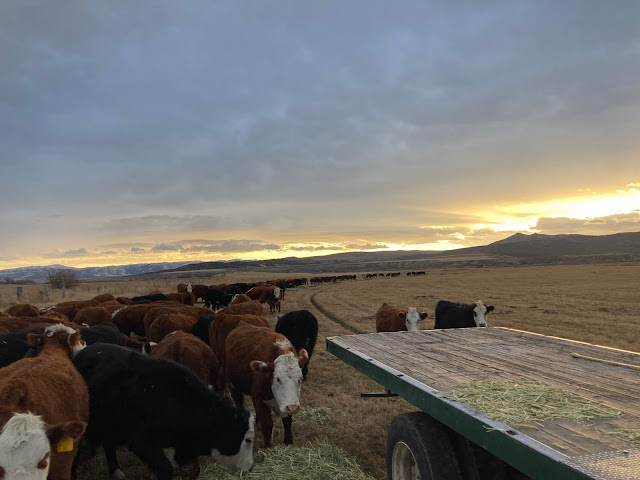Christmas has its charms, but the part I like best is when it’s over. Too many gifts, too much chocolate (I didn’t mean that) and too many expectations.
Christmas dinner was going okay, a bit harried at the last minute, but it always is, when Mark asked, "When are we going to eat because I forgot to break the ice on the water trough for the bulls?" Could he not see I was pouring the gravy in to the gravy boat and everything was ready? Turns out no one cared that the meal was lukewarm by the time he got back. No one but me.
We started feeding the cow herd the day after Christmas. Grazing is more satisfying for sure, but there’s something comforting about the repetitive nature of feeding. I love my daily stint kicking off one load to the heifers, especially the part where I get to walk home and leave the rest of the day’s work to everyone else.
We raise some of our own hay and buy the rest from our neighbors. We provide a service to our community by using forage grown on land that is best left under a perennial crop. Unlike the annuals - wheat, potatoes and corn - alfalfa fields stay put when the wind blows. The air blows fresh and clean across them, the soil safely covered with stubble and securely anchored by deep roots that stretch down in to the soil profile.
I always love a brand new year and the long nights of winter. A kind of magic happens as the sun goes down and I rummage in the kitchen for our supper. There is finally time to read, to discuss what we're reading, and to explore Netflix and PBS for good programming.
We watched a documentary on Lewis and Clark on New Year’s Eve. I got out the atlas and followed their journey up the Missouri. I was especially interested in how the land looked before we Europeans changed everything. The narrator spoke of the Great Plains as a Garden of Eden, with wild grazers spread across a sea of grass. He spoke of the diversity of native peoples the men encountered, the peaceful Mandans and the fierce Lakota Sioux among them. It's breathtaking to consider the impact we have wrought over these scant 200 years since the Corps of Discovery opened the doors to the northwest in 1806. We see Lewis and Clark as heroes of course, but something about that image is flawed isn’t it? It was the beginning of the end of a way of life for the natives and the wild ecosystem in which they lived.
I’m reading Irrigated Eden, by Mark Fiege, the story of Idaho’s Snake River Valley and the farmers that diverted its waters to grow crops starting in the late 1800's, not so long after Lewis and Clark made their journey. The book talks of a now disturbed hydrologic cycle and the unintended consequences no one could have foreseen. It describes the romance of green, flood irrigated fields surrounding tidy pioneer homes, a vision that hits very close to home here on Pratt Ranch. It tells the story of farmers, when water supplies drew scarce, banding together as partners to store, distribute and share the precious resource. This message is more important now than ever. As Idaho's population grows, the climate shifts and agriculture must respond, it's obvious that it will take all of our wits, science, and collaborative efforts to navigate the next hundred years of irrigation policy.
Long winter evenings are for adventuring. For learning new
things, pondering old things, and conjuring the vision of a new year.
 |
| a typical morning |
 |
| still grazing before Christmas |
 |
| 2021 begins |
No comments:
Post a Comment